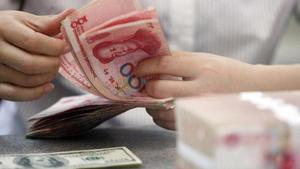 In this Aug 11, 2015 file photo, a worker counts Renminbi notes at a bank in Linyi, east China's Shandong province. (ZHANG CHUNLEI / XINHUA)
In this Aug 11, 2015 file photo, a worker counts Renminbi notes at a bank in Linyi, east China's Shandong province. (ZHANG CHUNLEI / XINHUA)
The US Federal Reserve's decision to keep interest rates at near zero for the foreseeable future will have little effect on China's monetary policy, which will continue to remain prudent for the rest of the year, experts said.
The appreciation of the renminbi will make yuan-denominated assets more attractive, including Chinese government bond. More foreign capital inflows into the country can be expected, said Wang Youxin, a researcher at the research institute of Bank of China
The US Fed said after a policy meeting on Wednesday that short-term rates will remain at 0 percent to 0.25 percent. Fed officials said that they expect to keep the interest rates at zero through 2023 and added that they will not raise borrowing costs until inflation has reached 2 percent and "moderately exceeds" that level for an extended period.
The long-term low interest rate will, however, impair the greenback's position, said experts. After the Fed decision was announced, the US Dollar Index, or DXY-a key gauge that reflects the US dollar's position in the foreign exchange market-shed 0.14 percent to 92.95 on Wednesday.
The relatively bearish performance of the US dollar has further boosted the renminbi exchange rate. The offshore US dollar-yuan rate hit 6.75 on Thursday, which is up by more than 4,300 basis points since the end of May.
READ MORE: US Fed keeps interest rates near zero, likely to stay until 2023
Wang Youxin, a researcher at the research institute of Bank of China, said that the US Fed will maintain a loose monetary policy and low interest rate environment for a long time.
The decline in the DXY index, uncertainties about epidemic control in the US and the slowdown in the US economic recovery, will further support the renminbi exchange rate position.
In addition, the appreciation of the renminbi will make yuan-denominated assets more attractive, including Chinese government bond. More foreign capital inflows into the country can be expected, said Wang. The current bullish position of the renminbi exchange rate will also help stabilize China's financial market and promote the internationalization of the yuan, he said.
READ MORE: China's yuan gains versus dollar and peers as optimism prevails
On the other hand, China has lowered the reserve requirement ratio three times this year.
Zhou Junzhi, macroeconomic analyst at GF Securities, said RRR cuts are required only when the central government needs policies to boost market demand. As market demand has started to rebound in the second half of the year, the authorities will look to curb the expansion in aggregate financing and chances of RRR cuts are largely reduced.
Zhou said that China will not tinker with its monetary policy in the short term. Given the uncertainties in the overseas and domestic markets, the central government will prefer to keep the monetary policy stable to ensure growth and employment, and adjust the economic development structure to avoid risks.
ALSO READ: Healthy August data lift yuan to 16-month high
Sun Guofeng, head of the PBOC's monetary policy department, said in a news conference on Aug 25 that China will not use extreme measures such as cutting interest rates to zero or below, or adopt quantitative easing to shore up the economy. The central regulator will maintain a prudent monetary policy in China, which is moderately flexible to avoid insufficient or excessive liquidity, he said.
The COVID-19 epidemic has caused more uncertainties and affected the financial market sentiment to some extent. It is therefore important to keep the country's monetary policy unchanged to deal with the uncertainties, he said.


